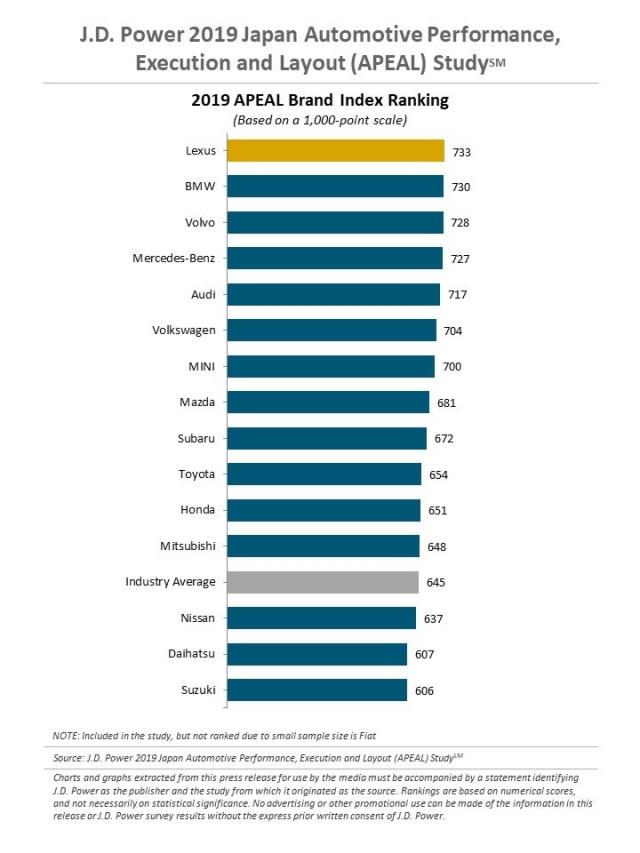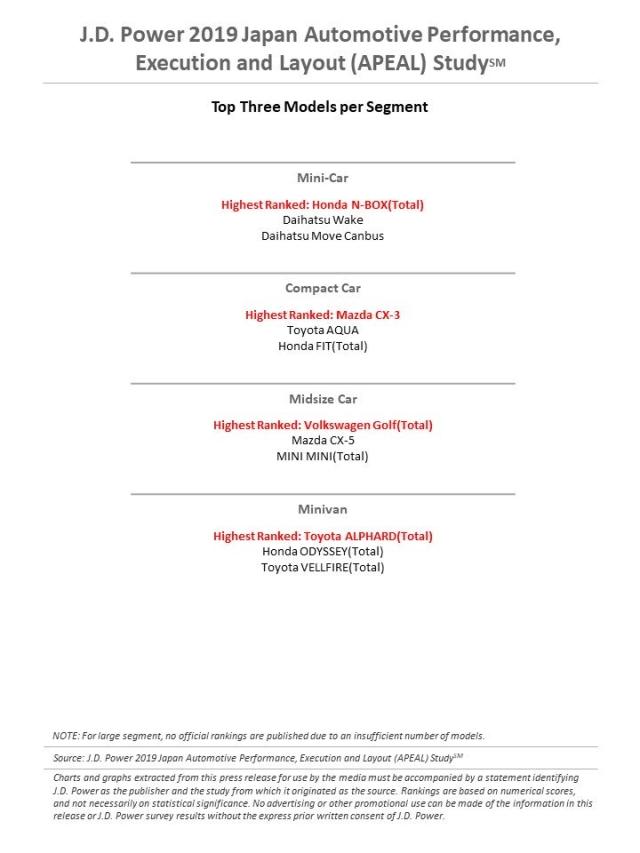TOKYO: 19 Sept. 2019 — Electric vehicles exceeded the industry average for satisfaction in the fuel economy category for the first time, according to the J.D. Power 2019 Japan Automotive Performance, Execution and Layout (APEAL) StudySM, released today.
“Although electric vehicles still have driving range challenges, they have acquired strengths which are comparable with internal-combustion engine vehicles,” said Atsushi Kawahashi, Senior Director of the Automotive Division at J.D. Power. “If electric vehicles are considered as a realistic option for consumers, the picture of the future automobile market could change drastically.”
Following are some of the key findings of the 2019 study:
- Electric vehicle satisfaction exceeds industry average level in the fuel economy category: Among electric vehicles, satisfaction in the fuel economy category is 644 (on a 1,000-point scale), exceeding the industry average of 636 for the first time. In the fuel economy category, the APEAL score of the driving range between each refueling/recharging attribute (6.07 on a 10-point scale) is still lower than the industry average of 6.50). The score of a vehicle's fuel economy attribute (6.75) is well above the industry average 6.26. Fuel economy is traditionally an area of weakness for electric vehicles, but the balance of efficiency and driving range is overcoming this weakness.
- More than half of 58 models improve: The industry average satisfaction index score has increased to 645 in 2019, up 7 points from 2018. Among the 58 models included in both the 2018 and 2019 studies, 37 models have improved in new-vehicle appeal since 2018. Satisfaction also has improved by 6-9 points in all categories, which raises the level of overall new-vehicle appeal.
- Largest improvement in minivan segment: In the minivan segment, the overall APEAL score has increased by 14 points since 2018 to 658 in 2019, a larger improvement than for any other segment. Among the 10 models in the minivan segment which are included in both the 2018 and 2019 studies, nine models have improved in appeal since 2018.
- New-vehicle appeal for four German brands exceeds the industry average: The overall APEAL scores of four German brands (Audi, BMW, Mercedes-Benz and Volkswagen) have increased by 14-21 points since 2018. These increases are above the average improvement in the industry (+7, year over year), which indicates these four German brands have made substantially more progress in improving new-vehicle appeal than the industry in general.
- German brands improve the audio-related attributes in ACEN: Reasons for improvements in new-vehicle appeal differ depending on the brand, but all four German brands have improved in the ACEN category (up 21-43 points, year over year). In particular, satisfaction in audio-related attributes (e.g., quality of sound from speakers, ease of using vehicle's audio system while driving, attractiveness of audio system display, look and feel of audio controls, and ease of playing external music devices) have notably increased. The results of the four German brands’ efforts to improve these areas are increasingly accepted by users as new vehicle strengths.
Highest-Ranked Brands
Lexus ranks highest in overall APEAL with a score of 733. Volkswagen ranks highest in the mass market segment, with a score of 704.
Segment-Leading Models
- Mini-car segment: Honda N-BOX
- Compact segment: Mazda CX-3
- Midsize segment: Volkswagen Golf
- Minivan segment: Toyota Alphard
The 2019 Japan APEAL Study is based on responses from 21,728 purchasers of new vehicles in the first two to nine months of ownership. The study was fielded online from May through June 2019. The annual study, now in its ninth year, examines how gratifying a new vehicle is to own and drive. Owners evaluate their new vehicle across 77 attributes, grouped into 10 categories of vehicle performance: exterior; interior; storage and space; audio/communication/entertainment/navigation (ACEN); seats; heating, ventilation and air conditioning (HVAC); driving dynamics (driving performance); engine/transmission; visibility and safety; and fuel economy.
About J.D. Power and Advertising/Promotional Rules www.jdpower.com/business/about-us/press-release-info

